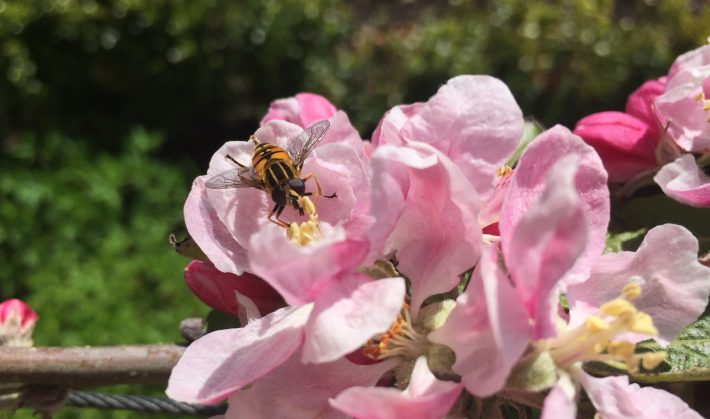Call for policy makers to protect pollinators
Scotland’s Rural College press release.
Pollinating insects could thrive if improvements are made to agri-environment schemes across Europe, finds new study led by Scotland’s Rural College (SRUC) and published in Journal of Applied Ecology.

More than 20 pollinator experts from 18 different countries looked at a range of wildlife habitats on farmland – named Ecological Focus Areas (EFAs) – to determine how well they support insect pollinators such as bumblebees, solitary bees and hoverflies.
Despite significant investment in EFAs, the study published in the Journal of Applied Ecology – found they are failing to provide all the resources insect pollinators require.
With over 70 per cent of crops worldwide relying on insect pollinators, it highlights the need to create a variety of interconnected, well-managed habitats that complement each other in the resources they offer.
A decline in the number of insect pollinators has been attributed to intensive farming and the associated loss of flower-rich habitats which provide food, nesting and breeding sites.
In a bid to decrease the environmental impact of agriculture, the 2014 EU Common Agricultural Policy (CAP) defined a set of habitat and landscape features that farmers needed to incorporate in order to receive basic farm payments.
Researchers from SRUC joined forces with 22 pollinator experts from across Europe to evaluate how different EFA options varied in their potential to support insect pollinators – under both standard and pollinator-friendly management, as well as the extent of farmer uptake.
They identified substantial opportunities to improve the quality of agri-environmental habitats by implementing pollinator-friendly management practices. These would not only increase the abundance of resources in a habitat, but also the range of resources.
The findings of the study, which was funded under the Cost Action Super-B – Sustainable Pollination in Europe programme, will be used to inform the CAP post-2020.
Lead researcher Dr Lorna Cole, an agricultural ecologist at SRUC, said: “With the CAP post-2020 fast approaching, our study highlights that to effectively conserve pollinators, we need to improve habitat quality. With different habitats offering different resources we also need to focus on increasing habitat diversity to ensure that our countryside provides the range of resources that pollinators require.”
The article can be read for free (for a limited time) here:
, , , et al. A critical analysis of the potential for EU Common Agricultural Policy measures to support wild pollinators on farmland. J Appl Ecol. 2020; 00: 1– 14. https://doi.org/10.1111/1365-2664.13572
Media contact:
Rosie Free rosie.free@sruc.ac.uk; 0131 535 4219
Like what we stand for?
Support our mission and help develop the next generation of ecologists by donating to the British Ecological Society.